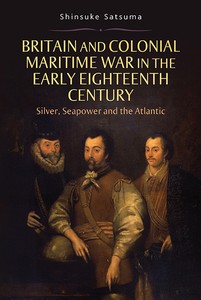Britain and Colonial Maritime War in the Early Eighteenth Century: Silver, Seapower and the Atlantic
Shinsuke Satsuma
 Britain and Colonial Maritime War in the Early Eighteenth Century is adapted from the author's PhD research at the University of Exeter. Satsuma identifies an argument used in Britain to promote the idea of war at sea (particularly in the new world) during the War of Spanish Succession and traces its origin, its deployment, and its evolution. Satsuma claims that this argument affected policy and helps explain some of the decisions made by various political factions, but that it is distinct from actual or ideal government policy as explored by other historians, such as Daniel Baugh's 'blue water policy'. The text relies on early eighteenth-century political writing, including letters, pamphlets and government documents, to trace the argument and understand the political attitudes towards colonial maritime war in the early eighteenth century.
Britain and Colonial Maritime War in the Early Eighteenth Century is adapted from the author's PhD research at the University of Exeter. Satsuma identifies an argument used in Britain to promote the idea of war at sea (particularly in the new world) during the War of Spanish Succession and traces its origin, its deployment, and its evolution. Satsuma claims that this argument affected policy and helps explain some of the decisions made by various political factions, but that it is distinct from actual or ideal government policy as explored by other historians, such as Daniel Baugh's 'blue water policy'. The text relies on early eighteenth-century political writing, including letters, pamphlets and government documents, to trace the argument and understand the political attitudes towards colonial maritime war in the early eighteenth century.
The pro-maritime war argument that Satsuma identifies was historical grounded in the English experience of conflict, especially privateering, in the West Indies in the sixteenth and seventeenth centuries. It promoted war with Spain as economically advantageous: profits from the capture of Spanish prizes, especially the Flota ships, could pay for other operations, limiting the financial burden on the nation. Additionally, war could provide an opportunity to create new trading opportunities with Spanish colonies, either through treaty or by establishing new British colonies in Spanish territory. Proponents of the argument were not unified in their approach or in their broader political ideologies, but only in their support of the idea.
During the War of Spanish Succession, successful deployment of the pro- maritime war argument resulted in some expeditions, including to Quebec in 1710, and plans for expeditions to the West Indies and the South Seas (particularly the Pacific American coast) that were ultimately mired in political and bureaucratic issues and never carried out. Satsuma argues that the political negotiations at the end of the war appeared to offer alternative routes to securing goals similar to those advanced by supported of the pro-maritime war argument, such as the government's control of the Spanish Asiento trade, and that war began to appear less attractive. During the War of the Quadruple Alliance and Anglo Spanish Conflict of 1726-1729 the pro-maritime war argument resurfaced in a slightly different form, and by the end of the period of conflict it had changed from a tool of the government to a tool of the opposition.
Satsuma uses the discourse surrounding war at sea to explain the decisions and actions of the government and people in power. The pro-maritime war argument examined is defined very broadly, and as such it is not surprising to find that it persists. Satsuma's more interesting contribution is revealing how the promotion of this argument persistently affected actual policy, legislation, and, in some cases, practice in terms of Britain's maritime warfare and international relations in the period.
- Woodbridge, Suffolk: The Boydell Press
- 2013 6-1/2” x 9-1/2”, hardcover, xii + 284 pages
- Illustrations, notes, bibliography, index. $115.00
- ISBN: 9781843838623
Reviewed by Heather Hatch, Texas A&M University
